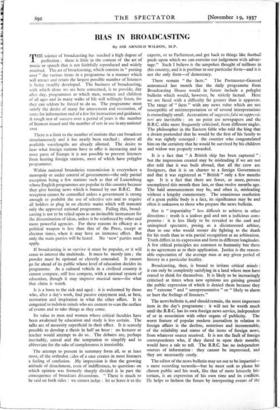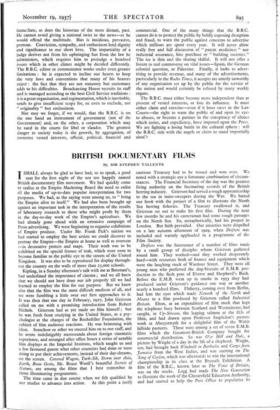BIAS IN BROADCASTING
By SIR ARNOLD WILSON, M.P.
THE science of broadcasting has reached a high- degree of perfection : there is little in the content of the art of music or speech that is not faithfully reproduced and widely received. The art of broadcasting, which consists in " putting over " the various items in a programme in a manner which will attract and retain the largest possible number of listeners is being steadily developed. The business of broadcasting, with which alone we are here concerned, is to provide, day after day, programmes to which men, women and children of all ages and in many walks of life will willingly listen, for they can seldom be forced to do so. The programme must satisfy the desire of many for amusement and recreation, of some for information and of a few for instruction and guidance. A rough test of success over a period of years is the number of licences issued and the number of sets in use in any national area.
There is a limit to the number of stations that can broadcast simultaneously and it has nearly been reached ; almost all available wavelengths are already allotted. The desire to hear what foreign stations have to offer is increasing and in most parts of Europe it is not possible to prevent listeners from hearing foreign stations, most of which have polyglot programmes.
Within national boundaries transmission is everywhere a monopoly or under control of governments—the only partial exception being a few stations such as that of Luxemburg whose English programmes are popular in this country because they give betting news which is banned by our B.B.C. But reception cannot be controlled unless a government is strong enough to prohibit the use of selective sets and to require all holders to plug in on electric mains which will transmit only the approved national programme. Failing this, broad- casting is not to be relied upon as an invincible instrument for the dissemination of ideas, unless it be reinforced by other and more powerful agencies. For these reasons its efficacy as a political weapon is less than that of the Press, except at election times, when it may have an immense effect. But only the main parties will be heard. No `new' parties need apply.
If broadcasting is to survive it must be popular, or it will cease to interest the multitude. It must be mostly jam ; the powder must be optional or cleverly concealed. It cannot go far ahead of its public whose level of education decides its programme. As a cultural vehicle in a civilised country it cannot compare, still less compete, with a national system of education, though it may improve musical taste—for what that claim is worth.
It is a boon to the sick and aged : it is welcomed by those who, after a day's work, find passive enjoyment and, at best, recreation and inspiration in what the ether offers. It is congenial to indolent minds who are content to scan the surface of events and to take things as they come.
Its value to men and women whose critical faculties have been awakened by education and study is less certain. The talks are of necessity superficial in their effect. It is scarcely possible to develop a thesis in half an hour : no lecturer or teacher would attempt to do so.. The debates are, perhaps inevitably, unreal and the temptation to simplify and to abbreviate for the sake of completeness is irresistible.
The attempt to present in summary form all, or at least most, of the orthodox :ales of a case creates in most listeners a feeling of confusion. My impression is that the growing attitude of detachment, even of indifference, to questions on which opinion was formerly sharply divided is in part the consequence of broadcast discussions. " There is much to be said on both sides : we cannot judge : let us leave it to the experts, or to Parliament, and get back to things like football pools upon which we can exercise our judgement with advan- tage." Such I believe is the unspoken thought of millions in this country, and it is perilous to our particular form—and it is not the only form—of democracy.
There remain " the facts." The Postmaster-General announced last month that the daily programme from Broadcasting House would in future include a polyglot bulletin which would, however, be strictly factual. Here we are faced with a difficulty far greater than is apparent. The range of " facts " with any news value which are not susceptible of misinterpretation or of several interpretations is exceedingly small. Accusations of suggestio falsi or supprenio veri are inevitable : on no point are newspapers and the B.B.C. alike more frequently criticised, from different angles. The philosopher in the Eastern fable who told the king that a dream portended that he would be the first of his family to die was rightly scourged the courtier who congratulated him on the certainty that he would be survived by his children and widow was properly rewarded.
It is a fact that " A British ship has been captured " : but the impression created may be misleading if we are not also told that it was built abroad, that all the crew are foreigners, that it is on charter to a foreign Government and that it was registered as " British " only a few months ago. It is a fact that there are fewer, or more, persons unemployed this month than last, or than twelve months ago. The bald announcement may be, and often is, misleading without a lengthy commentary. The unanimous resolution of a great public body is a fact, its significance may be and often is unknown to those who prepare the news bulletin.
Nor is " impartiality " less difficult to achieve in other directions : truth is a jealous god and not a judicious com- promise : it is less likely to be revealed to the cool and uninspired spectator, posing as a disinterested arbiter, than to one who would sooner die fighting to the death for his truth than to win partial recognition at an arbitration. Truth differs in its expression and form in different longitudes. A few ethical principles are common to humanity but there is no agreement as to their application. Justice is the reason- able expectation of the average man at any given period of history in a particular locality.
Broadcasting, then, is bound to irritate critical minds : it can only be completely satisfying in a land where men have ceased to think for themselves. It is likely to be increasingly criticised at times when new opinions are gaining ground the public expression of which is denied them because they are " extreme " and " unrepresentative " or " likely to alarm or hurt the feelings of listeners."
The news bulletin is, and should remain, the most important item in the day's programme : it will not be worth much until the B.B.C. has its own foreign news service, independent of or in association with other organs of publicity. The worst feature of popular modern journalism in relation to foreign affairs is the decline, notorious and incontestable, of the reliability and status of the items of foreign news, from whatever source received. It is not the fault of foreign correspondents who, if they dared to open their mouths, would have a tale to tell. The B.B.C. has no independent sources of information : they cannot be improvised, and they are necessarily costly.
The editor of the news bulletin may set out to be impartial— a mere recording turnstile—but he must seek to please his chosen public and his work, like that of more leisurely his torians, is an expression of his own time and its conflicts. He helps to fashion the future by interpreting events of the immediate, as does the historian of the more distant, past. He cannot avoid giving a national twist to the news—or he would offend the multitude. Bias is insidious, pervasive, protean. Conviction, sympathy, and enthusiasm lend dignity and significance to our short lives. The impartiality of a judge derives not from his upbringing but from the law he administers, which requires him to prejudge a hundred issues which in other climes might be decided differently. The B.B.C. editor or commentator works under even greater limitations : he is expected to incline our hearts to keep the very laws and conventions that many of his hearers reject : the fact that they are not statutory but customary adds to his difficulties. Broadcasting House recruits its staff and is managed according to the best Civil Service traditions : it is a great organisation, and regimentation, which is inevitable, tends to give insufficient scope for, or even to exclude, not " originality " but enthusiasm.
Nor may we forget, if we would, that the B.B.C. is on the one hand an instrument of government (not of the Government) and, on the other, a corporation which may be sued in the courts for libel or slander. The greatest danger to society today is the growth, by aggregation, of immense vested interests, official, political, financial and commercial. One of the many things that the B.B.C. cannot do is to protect the public by boldly exposing deception and fraud, to warn the public against concerns to advertise which millions are spent every year. It will never allow really free and full discussion of " patent medicines " nor industrial assurance, hire purchase or " building societies." The ice is thin and the skating skilful. It will not offer a forum to real controversy on vital issues—Spain, the German colonial question, or Palestine. Finally, it looks to adver- tising to provide revenue, and many of the advertisements, particularly in the Radio Times, it accepts are utterly unworthy of any organisation set up by the public for the service of the nation and would certainly be refused by many weekly organs.
The B.B.C. must either become more independent than at present of vested interests, or lose its influence. It must either claim and exercise—even if it loses cases in the Law Courts—the right to warn the public of and open its eyes to abuses, or become a partner in the conspiracy of silence which juries, and expediency, have imposed upon the Press. We are fighting a losing battle in the cultural sphere : will the B.B.C. side with the angels or claim to stand impartially aloof ?

















































































































 Previous page
Previous page